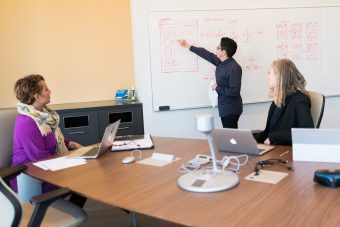
Climate change is one of the defining challenges of our times, and women are disproportionately vulnerable to it and have an important role in addressing it.
Tackling climate change effectively will require deep changes to how we live, work and think – and the only way these can be implemented is if everyone takes an active role and if the emerging opportunities related to the green transition are shared equitably.
There are many ways to understand how men and women experience climate change differently. Women form the majority of the world’s two billion poorest people, for instance, among whom the negative impacts of climate change are concentrated. Women are also often more affected than men by climate change impacts as a result of persisting gender norms and discriminations, for instance finding more obstacles in their way when borrowing to finance introducing greener technologies.
In the developing world, women are often the primary agricultural producers. As farmers, entrepreneurs, producers, consumers and household managers, women are key for implementing low-carbon strategies – and thus important agents of change. But, since women seldom own the land they work on, they have often been excluded from decisions on development. Including them can change outcomes.
Yet, to achieve the dual track of tackling climate change through gender action, we must recognise women as economic, social and political actors who play a crucial role in adopting new technologies, taking and supporting the tough decisions needed to spur action at scale, and seizing the opportunities that a new, greener economy can bring.
More:
At the EBRD, we recognise that gender equality has to be an integral part of green investment and policy action. In 2020, the new strategic priorities we set for the next five years centred on making our investments not only more green but also more inclusive, gender equal and digital. The critical connection between climate action and gender equality is at the heart of our agenda.
Over the past year, we have been integrating gender across EBRD’s flagship green programmes.
We promote women’s access to green skills and jobs. In Egypt and Kazakhstan, we leverage partnerships with our private sector clients, national ministries and education providers to enable women to gain “green skills” and promote their progression into careers in the renewable energy sector.
We support women entrepreneurs to adopt low-carbon technologies and promote access to green finance. In our Green Economy Financing Facilities (GEFFs), we are working with local banks to ensure that both men and women have access to green finance, low-carbon technology and entrepreneurship opportunities.
We improve women’s access to green infrastructure and services. Through the EBRD Green Cities programme, we are accelerating the transition to low-carbon cities while promoting women and men’s equal opportunities in the infrastructure sector. In Tbilisi, the capital of Georgia, one of our lead Green Cities, we signed a new metro project in 2020 that will provide commuters with comfortable and environmentally friendly transport, encouraging residents to shift from private to public transport and thus reducing air pollution. It will also tackle gender-based harassment on public transport, and open up opportunities for women to train as metro drivers.
We empower women to act as managers of natural resources. In Morocco’s agribusiness sector, we are helping female farmers adopt enhanced water management technologies in the face of a changing climate in the Saïss Plain region.
This year, we will be launching a new Strategy, further raising our ambition to affect positive change at the nexus of climate change and gender equality. One focus is on the EBRD Green Cities programme through its enhanced policy reforms on gender as part of municipal decision-making, budgeting and public engagement.
We will also promote the uptake of low-carbon technologies in industry in Armenia, Jordan, Kazakhstan, Morocco, Serbia, Tunisia, and Uzbekistan. Together with the Green Climate Fund, we will ensure that women will be able to harness the opportunities coming from these new technologies through access to skills and green jobs throughout the transition to a low-carbon economy.
Likewise, we are working closely with the European Investment Bank and the CDC Group, the UK’s development finance institution, through the 2X Climate and Gender Taskforce, an initiative aimed at leveraging the power of gender-smart investments for climate action.
In the run-up to November’s COP26 climate summit and beyond, we have a unique once-in-a-lifetime opportunity to build back better post-Covid.
I look forward to working with businesses, policy partners and other key stakeholders to jointly take this opportunity – for a more equal, green and sustainable future for all. Green and gender inclusion need to go hand in hand.
Source: EBRD



